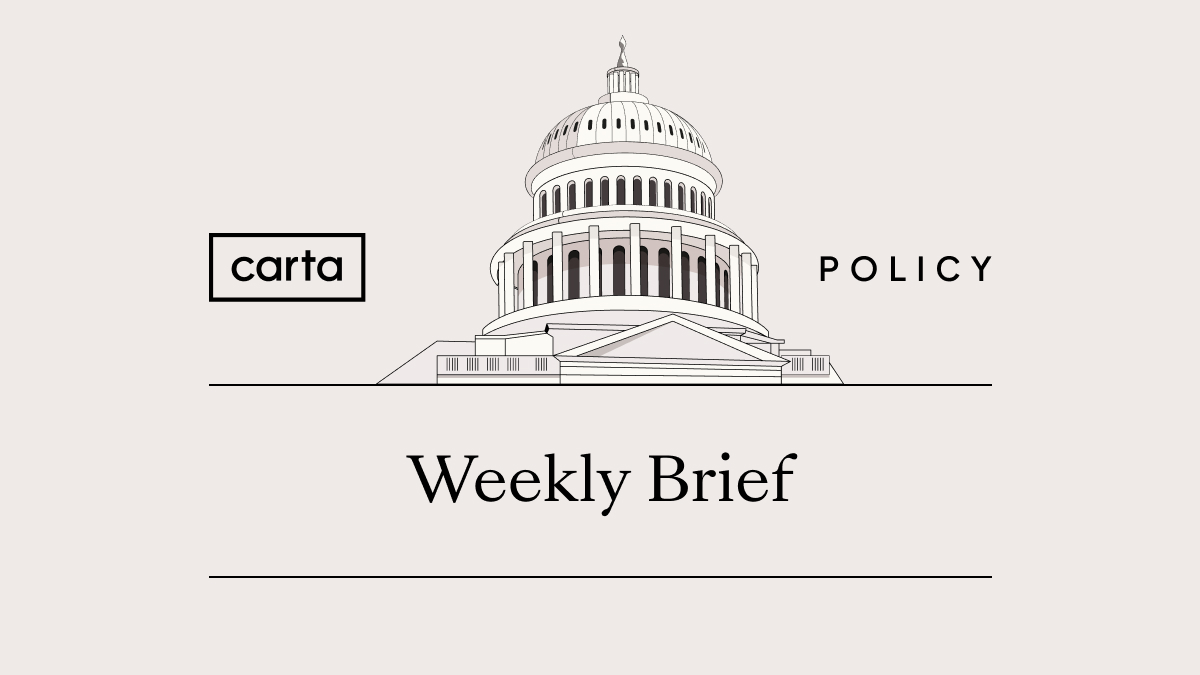Topline
-
Bipartisan stablecoin bill released in the Senate
-
SEC Small Business Forum explores policies to expand access to capital
-
SEC increasing scrutiny around Marketing Rule compliance
-
Committee advances innovation sandbox bill, FSOC guidance rollback
Bipartisan stablecoin bill released in the Senate
Action on stablecoin legislation progressed this week. Sens. Cynthia Lummis and Kirsten Gillibrand introduced the bipartisan Lummis-Gillibrand Payment Stablecoin Act, which seeks to impose a comprehensive regulatory regime for stablecoins. The bill addresses some of the contentious issues that have plagued discussions around the House stablecoin bill, particularly the division of authority between the Federal Reserve and the state regulators. Loosely based off of the House stablecoin framework, the bill would:
-
Require stablecoin issuers to maintain one-to-one reserves and prohibit unbacked, algorithmic stablecoins
-
Create federal and state regulatory regimes for stablecoin issuers, clarifying authority between the Fed and state regulators and preserving the dual banking system
-
Overturn the SEC’s SAB 121 accounting rule, which blocks banks from providing crypto-asset custody
-
Permit state trust companies to issue payment stablecoins with a balance of less than $10 billion, while federal and state depository institutions can issue any amount
-
Grant the Federal Reserve or state financial regulators the ability to take independent, but coordinated, enforcement action against a depository institution issuer, but the agencies must act jointly for state trust companies
-
Provide a framework for FDIC receivership, create the development of interoperability standards, and subject stablecoin issuers to privacy and anti-money laundering (AML) rules
-
Prevent illicit or unauthorized use of stablecoins by issuers and users
Path forward: There increasingly looks like a path forward on stablecoin legislation. While some factions remain skeptical, with Sen. Elizabeth Warren urging that any new cryptocurrency legislation apply AML/CFT authorities to the entire digital asset ecosystem, other detractors have started softening. Senate Banking Chairman Sherrod Brown, a noted crypto skeptic, said he is willing to advance legislation governing stablecoins, provided his concerns were addressed and that it was part of a package that would also allow banks to do business with sellers of legal cannabis ( the SAFE Banking Act). Contemporaneously, the bipartisan leaders of the House Financial Services Committee are finalizing their legislation and also engaging with Senate Leader Chuck Schumer on a path forward. Nothing is done until it is done, but stablecoin legislation has clear traction and momentum.
Why it matters: Stablecoins often act as the intermediary between the cryptocurrency world and the traditional financial system, as they are supported by secure and highly liquid assets such as dollars or Treasuries. If passed, the presence of federal regulation would provide legal clarity and confer legitimacy on this asset class, potentially fostering wider acceptance and utilization.
SEC Small Business Forum explores policies to expand access to capital
The SEC hosted its 43rd Annual Small Business Forum, which provides an opportunity for the public and private sectors to convene and provide feedback on how to improve policies to increase access to capital. The event featured discussions covering familiar topics, including building entrepreneurial ecosystems, expanding the accredited investor definition, increasing the benefits of inclusivity in the venture capital ecosystem, and highlighting common pitfalls faced by entrepreneurs. In addition to content, participants voted to prioritize recommendations to bolster capital formation, which are provided in a subsequent report to Congress.
Carta submitted policy recommendations to be considered at the forum:
-
Expanding ownership opportunities for employees and investors, including modernizing the accredited investor definition and permitting structured access to professionally managed fund vehicles.
-
Increasing access to capital outside coastal funding hubs, including by expanding venture capital fund investment parameters and reducing frictions in the exempt offering framework.
-
Bolstering private markets to create better public companies, providing risk tolerant, patient capital to allow entrepreneurs to build, experiment, and scale.
-
Modernizing the tax code to drive growth and ownership, including through incentives like qualified small business stock (QSBS) to drive investment in startups and small businesses.
Why it matters: The forum recommendations, while not binding on the Commission, can bolster support for policies to expand access to capital and broader investment opportunities, as well as help soften anticipated SEC actions that could create friction in the capital formation process.

The private market regulatory landscape is changing. The SEC has adopted rules that will fundamentally impact how the venture capital industry is regulated, and also how it operates. Join Carta’s Policy Team on April 30 at 12 p.m. PT / 3 p.m. ET to learn more about:
-
How the SEC’s private fund adviser rules will impact venture capital fund advisers
-
How the SEC’s broader regulatory agenda will impact the private funds industry
-
How to navigate the shifting regulatory and policy landscape
SEC increasing scrutiny around Marketing Rule compliance
The SEC announced charges against five investment advisers for Marketing Rule violations—the second wave of enforcement actions targeting the recently implemented requirements. Four of the firms had removed the problematic marketing materials prior to engagement with SEC staff, and as a result, received more favorable settlement terms. A fifth adviser suffered harsher penalties, but was also accused of making false and misleading statements and only took remedial actions after SEC engagement.
Impact on private fund advisers: The Marketing Rule applies to SEC-registered investment advisers (RIAs), including private fund advisers. Private fund advisers should be cognizant of how gross and net performance are reported in communications with prospective or current investors, particularly if the fund utilizes leverage or capital call facilities.
-
If gross performance metrics are included, they must be presented alongside net performance with equal prominence. This applies when the fund manager is presenting performance of a single investment or group of investments from a private fund.
-
While the Marketing Rule does not prescribe a specific methodology or performance calculation, the rule requires gross and net performance to be calculated over the same time period using the same methodology, including if a fund uses subscription facilities.
-
As industry standards continue to develop, it is important to include clear disclosures around performance methodology and evidence to back up claims in marketing materials.
Why it matters: The SEC does not adopt rules in a vacuum. Marketing Rule compliance is a top exam priority, and scrutiny is likely to increase. And while the rules only directly apply to RIAs, the SEC could use its broader antifraud authority to challenge investor communications from exempt reporting advisers (ERAs) that are considered false or misleading based on principles underlying the Marketing Rule. Private fund advisers should be reviewing marketing materials to ensure they are in compliance with the rules and subsequently released guidance.
Committee advances innovation sandbox bill, FSOC guidance rollback
The House Financial Services Committee advanced over a dozen bills at its April markup, largely along partisan lines. The docket featured a mix of legislation to advance policy priorities and utilize the Congressional Review Act (CRA) to rescind rulemakings recently finalized by the Biden administration.
-
The Committee advanced a slate of CRA resolutions that would nullify the SEC’s climate disclosure rule and FSOC guidance that would make it easier to designate nonbanks—including private equity funds—as systemically important financial institutions, which would subject such entities to bank-like regulation by the Federal Reserve, among other rules.
-
The panel also approved Chairman Patrick McHenry’s Financial Services Innovation Act, which would create innovation offices in each financial regulator that could administer “sandboxes” for companies to launch innovative financial products and services without adhering to certain regulatory requirements that would otherwise apply.
Why it matters: While the CRA provisions to rescind administration rulemakings will not be signed into law, they signal that if the administration changes, many of its rules will come under scrutiny in the new Congress. Beyond pushing back on existing rulemakings, Chairman McHenry continues to champion avenues for private industry to push innovative products forward without being hampered by the more traditional regulatory structure. It is unlikely this sandbox bill gets signed into law, but it keeps the drumbeat up that the regulatory system must adapt and foster innovation.

Carta is hosting our next policy dinner on Wednesday, May 1, at Kokkari in San Francisco.
If you are part of the SF VC community or will be in the Bay Area, join us for a conversation around recent shifts in private market policy, what it means for the ecosystem, and how best to navigate the changing regulatory landscape.
News to know
-
Nunn introduces bipartisan CTA bill to cut red tape for small businesses. The Small Business Red Tape Relief Act will require the U.S. Department of Treasury to improve Corporate Transparency Act (CTA) education to small businesses and submit quarterly accountability reports to Congress with the number of businesses fulfilling the required reporting.
-
Justice Department to file antitrust suit against Live Nation. The agency is preparing to file an antitrust lawsuit against the Ticketmaster parent in the coming weeks that would allege the nation’s biggest concert promoter has leveraged its dominance in a way that undermined competition for ticketing live events, according to people familiar with the matter.
-
FTC to vote on noncompete rule next week. On April 23, the Federal Trade Commission is expected to finalize its controversial rule that would ban noncompete clauses in employment contracts.
-
SEC enforcement chief sends warning to compliance officials around AI risks. In remarks outlining how the agency is approaching AI and the risks it poses to investors, SEC Enforcement Director Gurbir Grewal sent a strong warning to compliance officials to not only understand the technology and associated risks, but to ensure any AI-related disclosures are not false or misleading, hinting at the possibility of personal liability for violations.
-
IRS to release report on Direct File. IRS Commissioner Danny Werfel said in his congressional hearing on Tuesday that he will soon have a full accounting of how the Direct File pilot program went, including how many people participated and how much it cost.
-
Manchin joins effort to kill SEC climate risk disclosure rule. Sen. Joe Manchin signed onto an effort to overturn the SEC's climate disclosure rule, becoming the only Democrat to back an effort led by Sen. Tim Scott and Senate Banking Republicans to kill the regulation.
-
SEC market surveillance called unconstitutional in new suit. Investors and a conservative think tank have challenged the constitutionality of the Consolidated Audit Trail (CAT), a market surveillance tool that will house virtually all U.S. trading data. The action was filed in the Fifth Circuit, which has been sympathetic to claims of regulatory overreach.
Upcoming events
-
Carta event: From India to International: How to Attract Global Investors - April 24 at 11:00 p.m. PT / 2:00 a.m. ET
-
House Small Business Committee Hearing: “ Under the Microscope: Examining FinCEN’s Implementation of the Corporate Transparency Act” - April 30 at 7:00 a.m. PT / 10:00 a.m. ET
-
Carta event: Startup Fundraising 101: Building Strategic Partnerships - April 30 at 10:00 a.m. PT / 1:00 p.m. ET
-
Carta event: Policy Playbook: Navigating the Shifting VC Regulatory Landscape - April 30 at 12:00 p.m. PT / 3:00 p.m. ET
-
SEC Small Business Capital Formation Advisory Committee Meeting - May 6 at 7:00 a.m. PT / 10:00 a.m. ET
-
SEC’s Eleventh Annual Conference On Financial Market Regulation - May 9 at 1:00 p.m. ET – May 10 at 7:00 p.m. ET
-
SEC’s 2024 Conference On Emerging Trends In Asset Management - May 16 at 9:00 a.m. ET

